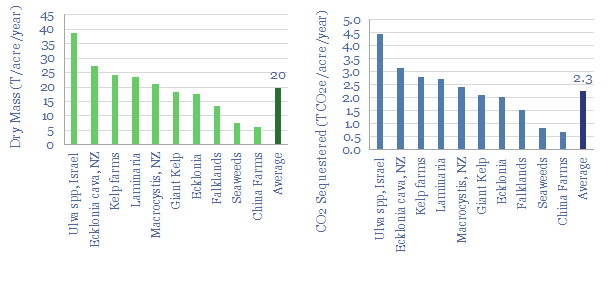Nature based carbon offsets could migrate offshore in the 2020s, sequestering 3GTpa of CO2 for prices of $20-140/ton. In a more extreme case, if CO2 prices reached $400/ton, oceans could decarbonize the world. This 19-page note outlines the opportunity in seaweed and kelp cultivation. It naturally integrates with maritime industries, such as offshore wind, offshore oil and shipping. Over 95% of the 30MTpa seaweed market today is in Asia, but Western companies are emerging.
Nature based solutions to climate change can be improved by limiting their land use and shoring up their longevity. These considerations naturally suggest a role for oceans, which cover 70% of the planet and are a 45x larger carbon sink than the atmosphere (pages 2-5).
Seaweed and kelp’s characteristics, as nature-based solutions, are spelled out on pages 6-8, explaining how they are cultivated, their typical biomass absorption rates, and their typical CO2 sequestration mechanisms.
World-scale potential as a carbon sink is outlined on pages 9-10, including the possibility of decarbonizing the world.
Commercialization is under way, across 30MTpa of seaweed and kelp cultivation in Asia, and a dozen interesting companies in the West. We profile some of the companies that stood out on pages 11-13.
Economics can be attractive, $20-40/ton CO2 prices enhance IRRs and will help the opportunity to scale up. But $400/ton CO2 prices are needed for pure sequestration projects that do not yield any sellable biomass (pages 14-17).
Integration options with pre-existing maritime industries, as well as conclusions for the world’s route to net zero, are spelled out on pages 18-19.
